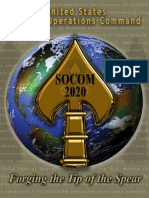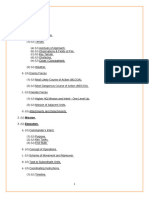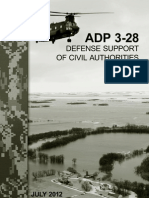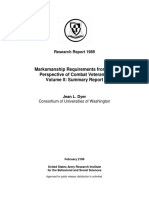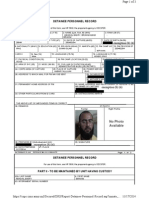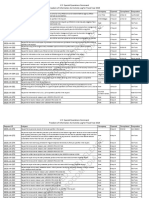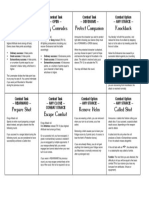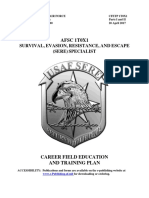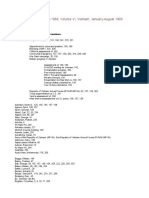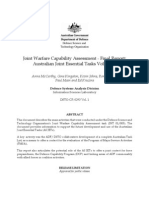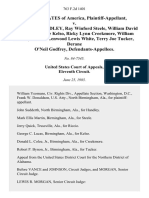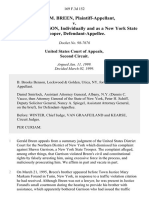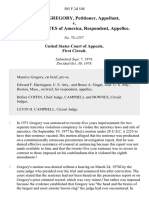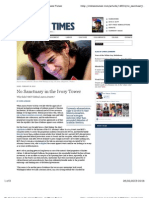100%(2)100% found this document useful (2 votes)
4K views82 pagesTrial Transcripts
brian nelson
Uploaded by
edmoloneyCopyright
© © All Rights Reserved
We take content rights seriously. If you suspect this is your content, claim it here.
Available Formats
Download as PDF or read online on Scribd
100%(2)100% found this document useful (2 votes)
4K views82 pagesTrial Transcripts
brian nelson
Uploaded by
edmoloneyCopyright
© © All Rights Reserved
We take content rights seriously. If you suspect this is your content, claim it here.
Available Formats
Download as PDF or read online on Scribd
You are on page 1/ 82
VION
2784
REGINA
Zz
BRIAN_NELSON
Before
THE RIGHT HONOURABLE LORD JUSTICE KELLY
on
Wednesday 22nd January 1992
(Rearraiagnment and Crown opening)
( ST )
Certified a true copy of the origina! filed in
the Appeals ond tists Office on the
if
12
13
14
1s
16
17
18
19
a
22
23
24
25
26
27
28
29
30
Wednesday 22nd vanuary 1272
R v Brian Nelson
pc From 11.10
MR CREANEY: My Lord,
bill which is the bill involving Brian Nelson,
'g ask your Lordship to deal with, the
retis
bill number 200 of 1991.
LORD JUSTICE KELLY: Yes.
MR CREANEY: I appear in this matter with my learned friend
Mr Brian Kerr and Mr Gordon Kerr for the prosecution.
MR BOAL: My Lord, I appear with my learned friend Nr
Brangham for the accused and might I just say before
the charge is put to him that this case was adjourned
from time to time last week and at the beginning of
this week at the request of the defence. That was
because of my own personal disposition and I want to
say I'm very grateful to the Court for the indulgence
it has shown.
ug CREANEY: My Lord, as a preliminary matter my Lord rd)
ask that a 35th count be added to the indictment. A
copy of that my Lord, has been furnished to my
Lordship's clerk and it alleges conspiracy to murder,
my Lora, and the particulars being that Brian Nelson,
on dates unknown between the 31st day of August 1987
and the 11th day of May 1988 in the County Court
Division of Belfast conspired to murder Declan McDaid.
LORD JUSTICE KELLY: Any objections?
MR BOAL: No objections. iE
LORD JUSTICE KELLY: What is the application?
MR BOAL: The application now is that the accused should be
rearraigned on ali the charges.
THE CLERK OF THE COURT: Ace you Brian Nelson?
HE DEFENDANT: Yes.
~au
© @
AL
12
13
14
15
16
Ww
18
19
22
22
23
24
25
26
a7
28
29
30
Wednesday 22nd January 1yy2
R v Brian Nelson
THE CLERK: On bill of indictment number 200 of 1991 you
stand charged on the 35th Count of conspiracy to
murder, contrary to Article 9(1) of the Criminal
Attempts and Conspiracy (Northern Ireland) Order 1983
and Common Law. Do you plead guilty or not guilty?
THE DEFENDANT: Not guilty.
THE CLERK: Upon application by your Counsel and direction
of his Lordship I am to rearraign you on bill of
indictment 200 of 1991. You stand charged on the 1st
Count with murder, contrary to Common Law. Do you
plead guilty or not guilty?
THE DEPENDANT: Not guilty.
THE CLERK: You are charged on the 2nd Count with
collecting information likely to be useful to
terrorists, contrary to section 22(1) (b) of the
Northern Ireland (Emergency Provisions) Act 1978.
Do you plead guilty or not guilty?
THE DEFENDANT: Not guilty.
THE CLERK: You stand charged on the 3rd Count --~
MR CREANEY: Would you put Count 5 now please? Don't put
Counts 3 and 4.
THE CLERK: You stand charged on the 5th Count with
conspiracy to murder, contrary to Article 9(1) of the
Criminal Attempts and Conspiracy (Northern Ireland)
Order 1983 and Common Law. Do you plead guilty or not
guilty?
THE DEFENDANT: Guilty.
MR CREANEY: Don't put Count 6 and 7 please.
THE CLERK: You stand charged on the 8th Count with
collecting information likely to be useful to
10
1
12
13
14
15
16
17
18
19
20
21.
22
23
24
25
26
27
28
29
30
Wednesday 22nd January 1992
R v Brian Nelson
terrorists, contrary to section 22(1) (b) of the
Northern Ireland (Emergency Provisions) Act 1978.
Do you plead guilty or not guilty?
THE DEFENDAN' Guilty.
CLERK: You stand charged on the 9th Count with
collecting information likely to be useful to
terrorists, contrary to section 22(1) (b) of the
Northern Ireland (Emergency Provisions) Act 1978.
Do you plead guilty or not guilty?
THE DEFENDANT: Guilty.
CLERK: You stand charged on the 10th Count with
possession of a document likely to be useful to
terrorists, contrary to section 22(1)(c) of the
Northern Ireland (Emergency Provisions) Act 1978.
Do you plead guilty or not guilty?
THE DEFENDANT: Guilty.
THE CLERK: You stand charged on the 11th Count with
conspiracy to murder, contrary to Article 9(1) of the
Criminal Attempts and Conspiracy (Northern Ireland)
Order 1983 and Common Law. Do you plead guilty or not
guilty?
THE DEFENDANT: Guilty.
MR CREANEY: Don't put Counts 12, 13 or 14.
THE CLERK: You stand charged on the 15th Count with
conspiracy to murder, contrary to Afticle 9(1) of the
Criminal Attempts and Conspiracy (Northern Ireland)
Order 1983 and Common Law. Do you plead guilty or not
guilty?
THE DEFENDANT: Guilty.
MR CREANEY: Don't put Counts 16, 17 or 18.
lo
11
12
13
14
is
16
aA
is
1s
20
21
22
23
24
25
ze
=
2!
as
Wednesday 22nd January 1992
Rv Brian Nelson
THE CLERK: You stand charged on the 19th Count with
conspiracy to murder, contrary to Article 9(1) of the
Criminal Attempts and Conspiracy (Northern Ireland)
Order 1983 and Common Law. Do you plead guilty or not
guilty?
DEFENDANT: Guilty.
MR CREANEY: Don't put Counts 20 or 21.
THE CLERK: You stand charged on the 22nd Count with
possession of a firearm with intent, contrary to
Article 17 of the Firearms (Northern Ireland) Order
1981. Do you plead guilty or not guilty?
DEFENDANT: Guilty.
MR CREANEY: Don't put Count 23.
THE CLERK: You stand charged on the 24th Count with
possession of a document likely to be useful to
terrorists, contrary to section 22(1)(c) of the
Northern Ireland (Bmergency Provisions) Act 1978.
Do you plead guilty or not guilty?
DEFENDANT: Guilty.
TSE CLERK: You stand charged on the 25th Count with
possession of a document likely to be useful to
terrorists, contrary to section 22(1)(c) of the
Northern Ireland (Emergency Provisions) Act 1978.
Do you plead guilty or not guilty?
DEFENDANT: Guilty. eo
THE CLERK: You stand charged on the 26th Count with
possession of a document likely to be useful to
terrorists, contrary to section 22(1)(c) of the
Northern Ireland (Emergency Provisions) Act 1978.
Do you plead guilty or not guilty?
-
A oe ww
10
11
12
13
14
15
16
17
18
19
20
21
22
23
24
25
26
27
28
29
30
THE
THE
THE
THE
THE
THE
THE
Wednesday 22nd January 1992
Rv Brian Nelson
: Guilty.
You stand charged on the 27th Count with
DEFENDAN’
CLERK:
possession of a document likely to be useful to
terrorists, contrary to section 22(1) (c) of ‘the
Northern Ireland (Emergency Provisions) Act 1978.
Do you plead guilty or not guilty?
DEFENDANT: Guilty.
CLERK: You stand charged on the 28th Count with
possession of a document likely to be useful to
terrorists, contrary to section 22(1)(c) of the
Northern Ireland (Emergency Provisions) Act 1978.
Do you plead guilty or not guilty?
DEFENDAN: Guilty.
CLERK: You stand charged on the 29th Count with
possession of a document likely to be useful to
terrorists, contrary to section 22(1)(c) of the
Northern Ireland (Emergency Provisions) Act 1978.
Do you plead guilty or not guilty?
DEFENDANT: Guilty.
CLERK: You stand charged on the 30th Count with
possession of a document likely to be useful to
terrorists, contrary to section 22(1)(c) of the
Northern Ireland (Emergency Provisions) Act 1978.
Do you plead guilty or not guilty?
DEFENDANT: Guilty. 6
CLERK: You stand charged on the 31st Count with
possession of a document likely to be useful to
terrorists, contrary to section 22(1)(c) of the
Northern Ireland (Emergency Provisions) Act 1978.
Do you plead guilty or not guilty?
Ss
10
iL
12
1s
14
15
16
17
18
19
°0
21
22
23
24
25"
26
27
28
29
30
THE DEFENDANT: Guilty.
Wednesday 22nd January 1992
Rv Brian Nelson
10
AU:
12
13
15
16
17
18
19
20
al
22
23
24
25
26
27
28
29
30
Wednesday, 22nd January 1992
R.v. Brian Nelson
(Cont'd) Rearraignment:
THE CLERK: You stand charged on the 32nd Count with
Possession of a document likely to be useful’ to
terrorists, contrary to section 22(1)(c) of the
Northern Ireland (Emergency Provisions) Act 1978.
Do you plead guilty or not guilty?
THE DEFENDANT: Guilty.
THE CLERK: You stand charged on the 33rd Count with
collecting information likely to be useful to
terrorists, contrary to section 22(1) (B) of the
Northern Ireland (Emergency Provisions) Act 1978.
Do you plead guilty or not guilty?
THE DEFENDANT: Guilty.
THE CLERK: You stand charged on the 34th Count with
possession of a document likely to be useful to
terrorists, contrary to section 22(1)(c) of the
Northern Ireland (Emergency Provisions) Act 1978.
Do you plead guilty or not guilty?
Guilty.
THE DEFENDAN’
MR CREANEY: Count 35.
LORD JUSTICE KELLY: Mr Creaney, he has been arraigned on
Count 1, but not on Count 7, I think, Is that
intended?
NR CREANEY: He was already arraigned on Count 7, my Lord
and pleaded not guilty to that.
Right.
LORD JUSTICE KELL!
THE CLERK: You stand charged on the 35th Count with
conspiracy to murder, contrary to Article 9(1) of the
Criminal Attempts and Conspiracy (Northern Ireiand)
10
12
13
14
15
16
17
18
19
79
21
22
23
24
25
26
27
28
29
30
Wednesday, 22nd January 1992
R.v. Brian Nelson
Order 1983 and Common Law.
Do you plead-guilty or not guilty?
THE DEFENDANT: Wot guilty.
LORD JUSTICE KELLY: Would you repeat, put the count again.
THE CLERK: You stand charged on the 35th Count with
conspiracy to murder, contrary to Article 9(1) of the
Criminal Attempts and Conspiracy (Northern Ireland)
Order 1983 and Common Law.
Do you plead guilty or not guilty?
THE DEFENDANT: Guilty.
THE CLERK: You may be seated with his Lordship's
permission.
MR CREANEY: My Lord, purely in relation to the mechanics of
the counts on the indictment my Lord, specific
instructions have been taken in relation to the counts
to which the accused has not pleaded guilty, and i
would ask that those counts remain on the books of the
court not to be proceeded with without leave of the
court. And reasons will be given for that my Lord, in
the Crown opening.
LORD JUSTICE KELLY: Tell me what those counts are?
MR CREANEY: My Lord I'll indicate, if I might, those counts
to you. Those are Count 1 my Lord, Count 2, Count 3,
Count 4, Count 6, Count 7, Count 12, Count 13, Count
14, Count 16, Count 17, Count 18, Count 20, Count 21,
Count 23 and that's the end of them.
LORD JUSTICE KELLY: Yes.
LORD JUSTICE KELLY: Mr Kerr.
MR B KERR: May it please your Lordship, in May 1988
Terence McDaid, then a thirty-one year old marcied man,
et aw
10
12
13
14
15
16
17
18
19
21
22
a
24
25
26
27
28
29
30
Wednesday, 22nd January 1992
R.v. Brian Nelson
lived with his wife and children at 4 Newington Street
in Belfast. For some four weeks before the 10th of May
1988 it had been customary for Mrs McDaid to take her
children swimming at Maysfield Leisure Centre on
Tuesday evenings. Her husband picked them up after the
swim, and it was customary for Terence's parents to
visit at 4 Newington Street. ‘The 10th of May was a
Tuesday, the 10th of May 1988, and the grandparents
arrived at the home at approximately 9:10 pm.
Terence NcDaid and his wife had not arrived home, but
some five minutes later they arrived and all of the
family, children, parents and grandparents entered the
home. ‘The children were taken to bed at approximately
9:55 or 10:00 pm, and the grandparents and parents then
sat by the fire talking.
Some five minutes later this quiet domestic scene
was shattered by the bursting open of the living room
door, and two men, one at least of whom was armed,
forced their way into the living room, and making
Terence McDaid their target they discharged seven
builets into his head and trunk causing his almost
immediate death. At seven minutes past ten an
ambulance was summoned and arrived at the scene at
One of the ambulance men believed that he
10:12 ‘pm.
could elicit a slight radial pulse, but at 10:25 pm
life was pronounced extinct. This horrific murder my
Lord, was made the more tragic and ghastly by reason of
the fact that Terence McDaid was not the intended
victim of the gunman. It is now clear that they had
intended to murder his brother Declan.
10
ul
12
13
14
15
16
a7
18
19
21
22
23
24
25
26
27
28
29
30
Wednesday, 22nd January 1992
R.v. Brian Nelson
My Lord on the 22nd of September 1988
Gerard Slane, a twenty five year old married man,
returned to his home at 11 Waterville Street, Belfast.
He lived there with his wife and three children, and he
In the course of
of
went to bed at approximately 1:30 am.
the night he and his wife were disturbed on a number
occasions by children coming into the bed and by his
wife's belief that someone was tampering with her car.
But his wife had gone back to sleep when sometime
between 4:15 am and 4:30 am the house was broken open.
Armed and masked men entered the home and in a vain
attempt to repel them, Gerard Slane threw a step-ladder
downstairs at the invaders. But they were not
repelled, and they shot him four times in the head
causing his instantaneous death.
My Lord on the 9th of November 1988 at
approximately 6:30 pm, Mary Kelly was preparing an
evening meal at her home at 10 Devenish Court in
Belfast. Present in the house were her three children,
John, Michael and Orla. Michael was aged seventeen.
A crack was heard at the front door and Mrs Kelly
walked into the hall and there was confronted by a
gunman standing in the doorway to the living room. On
entering the living room she saw another gunman
standing over her son Michael, who was Grouched on a
sofa. This gunman held a gun to the head of the
seventeen year old boy and pulled at his shoulder to
obtain a good look at him, at the same time demanding
his name. The boy replied ‘Michael’ repeatedly and
just then the voice of a third man was heard shouting,
fo
OY aw ow
10
UE
12
13
14
15
16
aT:
18
19
20
22
23
24
25
26
27
28
29
30
Wednesday, 22nd January 1992
R.v. Brian Nelson
“Come on* and thereupon all three left without harming,
at least physically, the occupants of the house. It
has been established my Lord that this incident was
part of a-plan to murder Patrick Monaghan.
My Lord on the 14th of November 1988 in the
evening, Barbara Morgan was in her home at
10 Devonshire Place, Belfast with her three children.
Her husband was not in the house at that time, he'd
been absent from about 3:00 pm. At 5:45 pm
approximately Mrs Morgan became aware of a gunman
standing in the living room. He brandished a gun in
his right hand and confronted Mrs Morgan, asking her
several times "Where is he?" On each occasion she
replied "Who?" And a second man, also armed, was in
the hallway of the home. It is clear my Lord, and it
has been established, that both were looking for
Mrs Morgan's husband, and it is equally clear that
their intent was to kill him had he been there,
My Lord in each of the incidents which I've just
described, the accused Brian Nelson played a vital,
indeed an indispensable role. But before describing
that role in those incidents, and indeed in other
incidents which form the background to the charges
which have been preferred against him, it is perhaps
appropriate to say something of the background of the
accused,
My Lord, at the time that these various incidents
occurred he was a member of the organisation which
describes itself as the Ulster Defence Association. He
first joined that organisation in 1972, and he became
“
SB aoa wf
10
iL
12
13
14
15
16
Ly,
18
19
21
22
23
24
25
26
27
28
29
30
Wednesday, 22nd January 1992
R.v. Brian Nelson
what has again been described as an Intelligence
Officer, in 1983. He left Northern Ireland in 1985 to
work in Germany, and in April or May 1987 was appointed
to the position of Senior Intelligence Officer. Now
running parallel with those develogments ny Lord, is
the circumstance that in 1983 he had, to use his own
words, offered his services to military intelligence
and indeed it was at the request of the Army that he
had returned from Germany to Northern Ireland in 1987.
From 1983 onwards, while he was in Northern Ireiand, he
was in regular communication with military contacts
known as handlers. And in the course of. such contacts
he provided information to his handlers of his
activities and the activities of others within the UDA.
On his appointment as Senior Intelligence Officer in
1987, he gained access to a considerable volume of
information which had been obtained by the UDA and
which was characterised by that organisation as
intelligence. My Lord, that information was built upon
and supplemented by Nelson's own activities in his role
as Senior Intelligence Officer. And in so far as it is
material to this case, this so called intelligence
onsisted of information about possible victims of
those murderous members of the UDA who sought out for
assassination individuals who they regarded as
legitimate targets. And my Lord, it is the Crown case
that it was in the collection of information about
those victims, often I may say carried out with great
astuteness and ingenuity, and in its dissemination and
Provision to those who he knew to be murderers and who
i
eu a
10
2
12
3
14
15
16
Ly,
18
19
20
22
23
24
25
26
27
28
29
30
Wednesday, 22nd January 1992
R.v. Brian Nelson
he knew would use the information to murder again, that
the accused played his pivotal role. And it's against
that background therefore, my Lord that I turn to
examine each of the main incidents which form the basis
of the charge against the accused. My Lord, I've
already described in broad outline the circumstances of
the murder of Declan McDaid. And as I've said it is
now clear that Declan NcDaid and not his brother
Terence, was in fact the intended victim. Now the
evidence against the accused in reiation to the 35th
Count, to which he has pleaded guilty, is that in the
latter part of 1987 the accused provided an index card
giving details of Declan McDaid to two UDA men known as
Hugh and Reid. Now nothing came of that relay of
information, but sometime later within the first few
months of 1988, Nelson was approached by a man known as
Winky Dodds. And Dodds asked Nelson for a target in
the West Belfast area. My Lord, Nelson knew that Dodds
was a killer, but despite that he gave Dodds the name
of Declan McDaid. At Dodds' request he set about
obtaining what information he could on Declan McDaid.
He conducted surveillance and saw HcDaid on several
occasions. He ascertained or discovered that he spent
a lot of time at 4 Newington Street. He reported to
Dodds that he was sure that Declan McDaid was staying
at Newington and he subsequently checked the Electoral
Register which confirmed that a McDaid was staying at
that address. Finally he gave Dodds an index card with
@ photograph of Declan McDaid and within a couple of
days to one week, Terence McDaid was shot dead at 4
B
a & oe w
on
10
w
12
13
14
15
16
17
18
19
20
zl
22
23
24
25
26
27
28
29
30
Wednesday, 22nd January 1992
R.v. Brian Nelson
Newington Street in the manner that I have described.
If I may turn now my Lord to outline the evidence
in relation to the charges numbered eight to ten on the
indictment, which arise out of the murder of Gerard
Slane. My Lord on the 7th of September 1988 one
William Quee was murdered outside a shop on Oldpark
Road, Belfast. Several persons were believed to have
witnessed the killing. ‘The. accused Nelson and another
UDA, so called officer, Thomas Lyttle Jnr, compiled a
section of photographs of suspected members of the
organisations known as the Irish National Liberal Army
and the Irish Peoples’ Liberal Organisation. The
accused collected one of the witness --- one of the
She
avowed witnesses and showed her the photographs.
picked out two photographs, one of whom was of
Gerard Slane. On enquiry from another UDA member, Eric
McKee, Nelson provided Slane's address and subsequently
Provided Slane's file card, as it has been described,
to James Spence, another member of the UDA, in the
knowledge that Spence would arrange for the killing of
Slane. He also checked Slane's address in the
He obtained the photograph of
Electoral Register.
Slane and he gave it to Spence, and he advised
Thomas Lyttle Jnr (known as Tosh Lyttle) on how to
carry out a recognizance of where Slane lived.
My Lord in relation to Count 15 on the indictment,
it has been established that sometime in 1988
Eric McKee, to whom I've referred in relation to the
Slane murder, asked Nelson to get something for
James Spence; again the same James Spence to whom I
it
oN a
©
10
AL
12;
13
14
15
16
17
18
19
21
22
23
24
25
26
a7
28
29
30
Wednesday, 22nd January 1992
R.v. Brian Nelson
And the request was made in the context
And
have referred.
that McKee wanted something for Spence to work on.
it's clear my Lord that the accused understood this to
mean that he should obtain a target for Spence.
My Lord it is to be remembered that by this time Nelson
knew of Spence not only by reputation but also of his
involvement in the Slane incident. He knew therefore
that his selection of Patrick Monaghan and his
identification of him to Spence effectively targeted
Monaghan for murder. Not only did he select Monaghan
however, he carried out a recognizance of where he
believed Monaghan lived. He noted and described to
Spence the type of door on the house. He checked the
Electoral Register but was not particularly perturbed
at the fact that a Monaghan was not listed as living at
that address. He considered that the intelligence
which he had obtained on him, that is on Monaghan, was
to use his own expression, "Very up to date". He
carried out visual sightings of Monaghan and he
volunteered this information and a description of the
appearance of Monaghan to Spence. He told Spence of
seeing Monaghan in the company of another person whom
he identified. And from the exchange that he had with
Spence he can have been in no doubt that it was the
intention of the UDA to murder Monaghan. And we say. my
Lord that the accused's participation in the planning
for the attack on Monaghan was both willing and
purposeful.
hy Lord I turn now to deal with the conspiracy to
murder James Morgan. my Lord sometime in 1988 in
‘6
10
aba
12
13
4
15
16
7
1B
a
20
al
22
23
2
25
25
2
2b
23
at
weanescay, ¢4na vanuary 1992
R.v. Brian Nelson
response to a request by Winky Dodds, to whom I've
referred, Nelson chose James Morgan as a target. He
Provided Dodds with so called intelligence data on
Morgan. He also provided a photograph. He again
checked the Electoral Register to ensure that Morgan
lived at the address given in the intelligence
material. Not only that, but he brought the Electoral
Register to Dodds and pointed out the entry in relation
to Morgan in it. He had made enquiries as to the area
in which Morgan's house was to be found and
subsequently he bought a map and helped Dodds further
to locate the Morgan house. Thereafter he went on foot
and on the day that he had
went to UDA
to reconnoitre the area,
positively identified Morgan's house he
headquarters and demonstrated to Dodds exactly where
the house was to be found. And again my Lord we submit
that all. of these factors indicated an active and
indeed willing participation in the plan to murder
James Morgan.
My Lord I turn now to deal with Count 5 on the
dictment, which charges that the defendant was guilty
of conspiracy to murder Alex Maskey. My Lord although
the accused's participation in this offence is similar
in some respects to his activities in the series of
offences which have already been described, the level
of activity and degree of participation of the accused
in this incident may be regarded as even more intense
than any of the other incidents. On the 17th of July
1988 the accused was told by a Ronald Bickerstaff that
Alex Maskey, a Sinn Fein councillor, had been observed
6
ane
1o
12
13
14
15
16
ay
18
19
21
22
23
24
25
26
27
28
29
30
Wednesday, 22nd January 1992
R.v. Brian Nelson
at The Gregory, a restaurant/bar on the Antrim Road.
His reaction was to assure Bickerstaff that he would
get onto it right away. He left his home some five
minutes after receiving this information and he drove
directly to the home of Winky Dodds, of whom we have
He and Dodds drove to The Gregory and confirmed
Dodds expressed
heard.
that Maskey's car was parked nearby.
himself, my Lord, as being unable to do anything about
it because he did not have ready access to weapons.
Nelson then drove Dodds home, but he did not rest
content there. He drove back to check that Maskey's
car was still parked where he'd seen it and he then
drove to Highfield Rangers Club. ‘There he met a
Matthew Kincaid, and he told Kincaid about Maskey and
then drove to another club where he met Jim Spence, who
set. about arranging to obtain a weapon in order to
carry out an attack on Maskey. He then volunteered to
check again whether Maskey’s car was still parked near
The Gregory but found it gone and he returned then to
Mayo Street to tell Spence. And we submit my Lord that
all of this activity could only be construed as
demonstrating not only willingness, but indeed
determination on the part of Nelson that an attack be
made on Maskey.
My Lord, a somewhat similar picture, although less
impressed in terms of time and less intensive perhaps
in the level of activity, emerges in relation to
Count 19 on the indictment which relates to the
conspiracy to murder Brian Gillen. My Lord it is clear
that the accused was well aware that senior members of
iF
10
ul
12
13
14
15
16
17
18
19
20
22
23
24
25
26
27
28
29
30
weonescay, 24nd January 1992
R.v. Brian Nelson
the UDA organisation had a well settled desire to carry
out the assassination of Brian Gillen. And in
furtherance of this and in his role as senior
intelligence officer the accused made contact with a
person in Lisburn. He was shown a bar which Gillen was
said to frequent. He characterised this information as
very sound when he discussed the matter subsequently
with James Spence. He offered, and indeed himself took
Eric McKee to Lisburn to show him the bar that had been
pointed out earlier to him. He indicated to McKee a
convenient parking place for a car to have access to a
dual carriageway. He carried out a recognizance to
locate the bar entrance and he offered to check whether
there were security cameras in place. He suggested to
McKee that Spence should be given the task of
assassinating Gillen. Now quite independantly and
indeed without consultation with others, he decided to
take a trip to Lisburn to attempt to establish a
sighting of Gillen. He produced a photograph of him
and gave a description of him to the proposed assassin
and he collected a homemade sub-machine gun for use in
the proposed murder. And we respectfully say therefore
my Lord that thus there was a number of obvious
features demonstrating the accused's willing
participation in this conspiracy my Lord, although it
is essentially incidental to the criminal liability of
the accused, it is evident we submit that although
Nelson was in contact with his handler over the period
that these events took place, and although it is
undeniable that he did provide his handler with
13
swn
Lo
1.
12
13
14
15
16
17.
18
19
21
22
23
24
25
26
27
28
29
30
LORD
LORD
AR B
ORD
Wednesday, 22nd January 1992
R.v. Brian Nelson
information in relation to them, we submit that he
failed to relay important information promptly, and
some information not at all. My Lord it is right that
I should say that throughout the period of the events
that I have been describing, Nelson was in regular
contact with his Army handlers. Indeed that contact
was regular/frequent between 1987 until his arrest, and
it is right that I should say also that in some
instances he gave his handlers quite extensive
information about his activities and those members of
the UDA with whom he was associated and to whom he was
passing information. But there was ample evidence that
there were occasions when the information passed was
neither as detailed nor as comprehensive as it could
and should have been. Equally my Lord there were
occasions when the information was not passed as
Promptly as it ought to have been, particularly in the
case of Maskey.
Well does that mean that sometimes no
JUSTICE KELL
information at all was passed?
KERR: Not until after the event, my Lord, The events
that I have described to your Lordship in relation to
the conspiracy to murder Alex Maskey were not passed to
the handler until those events had been completed.
My Lord in relation to the 24th Count on the
indictment -~
: Sorry to interrupt you.
JUSTICE KELL
KERR: Yes, your Lordship?
JUSTICE KELLY: But can you distinguish which cases in
which information in part was passed and those in which
F
Oda uw ew
10
11
12
13
14
15
16
17
18
19
a1
22
Fy
24
25
26
oy
28
29
30
B
Wednesday, 22nd January 1992
R.v. Brian Nelson
no information at all was passed?
KERR: Yes, my Lord. I think Maskey was the obvious
case where no information was passed until after the
event. Yes, in all other cases information was passed
of targeting, but we would say particularly my Lord in
the case of McDaid, the information which was given was
not nearly as comprehensive as it might have been; and
I'll return to that very briefly my Lord, later in the
opening.
LORD JUSTICE KELLY: Yes.
WE.
2
t 11:55
do
UR ue ae
©
10
ll
12
13
4
15
16
17
18
19
20
21
22
23
24
25
26
27
28
29
30
MR BRIAN KERR: My Lord,
Wednesday 22nd January 1992
Rv Brian Nelson
PC from WF at 11,55
(Cont'd) Facts Opened by MR BRIAN KERR (OC):
in relation to the 24th Count in
the indictment, the circumstances in relation to that
are that the defendant supplied Ronald Bickerstaff, to
whom I have made reference earlier, with approximately
40 index cards which he himself had compiled and these
contained details of various individuals and were
supplied to Bickerstaff in response to his request that
the accused should provide him with, and I quote, "a
number of targets within his (that is Bickerstafé's)
area." And, my Lord, it is abundantly clear that the
collecting of the material on the index cards was for
terrorist purposes and equally that's applied to
Bickerstaff particularly in the context of a response
to his request for targets which clearly was for
terrorist purposes.
My Lord, in relation to the 25th Count on the
indictment, the accused gave out a number of index
cards with information on individuals. Those
individuals were described as Provisional IRA or Irish
National Liberation Army suspects or Irish People's
Liberation Organisation suspects. Some 20 to 30 of
these cards was supplied to James Spence and again, my
Lord, the Crown would say that the circumstances in
which the accused had them in his possession
originally, and the purpose for which he supplied them
bit off no explanation but the information was of such
a nature as to be likely to be useful to terrorists in
planning or carrying out acts of violence. and, my
2
12
13
4
15
16
a7
18
19
20
22
23
24
25
26
27
28
29
30
Wednesday 22nd January 1992
Rv Brian Nelson
Lord, in relation to the 26th Count on the indictment,
Nelson was given four pages of names and addresses by
Eric McKee. They were said to pertain to suspected
members of the Provisional IRA in Belfast and
Londonderry. He was also given, my Lord, a set of
montage photographs. Subsequently about two months
after he had received them fron Mckee he was then
requested by McKee to provide him with information on
persons living in Londonderry. And he photocopied all
the montages and he typed up a copy of the persons
living in Londonderry among the group that he had been
given by McKee and he derived that from the written
material that had accompanied the montages and he gave
it to Eric McKee for onward transmission to the
Londonderry Brigade of the UDA.
My Lord, in relation to the Counts 27 and 28 on
the indictment, the circumstances are that on the 26th
of October 1987 the accused told his handler that he
had updated what he described as his 'P card system™.
He had photocopied files and supplied 5 copies to
different people in the Ulster Defence Association and
the avowed reason for that given by Nelson to his
handler was firstly to prevent the information being
lost in a security forces raid and secondly to increase
the targeting capacity of the UDA and we say, my Lord,
that the assertion made by Nelson in this context
constituted clear evidence of his willing participation
in the targeting of others. and the fact that that
evidence in support of those charges had been obtained
by the relay of information by Nelson to his handler in
2z
lo
11
12
13
14
1s
16
17
18
19
21
22
23
24
25
26
27
28
29
30
Wednesday 22nd January 1992
R v Brian Nelson
our respectful submission could not disguise or nullify
what his intention was in relation to the provision of
that information.
4y Lord, in relation to Counts 29 and 30 on the
indictment, the circumstances are that on the 16th of
August 1989 he had a meeting with his then handler and
he informed him, that is Nelson informed the handler,
that on the 8th of August 1989 one Jackie Anderson
called at his house and when he had been admitted he
explained to the accused that he was visiting on behalé
of one Samuel Austin and the Purpose of his visit was
expressed to be that Austin was in need of a new supply
Of photographs of known Republicans, particularly
members of the IPLO. Nelson, my Lord, promised to
Provide what he could but could only provide
Photocopies of his own photographs. He then drove to
his store in Forthriver Crescent, retrieved
approximately half of his stock of photographs and he
then visited Anderson's home from where both he and
Anderson drove to a location to photocopy the
Photographs and the copies were then handed to anderson
with the purpose that they would be delivered to
Austin.
My Lord, in relation to Counts 31 to 34 of the
indictment, again the evidence for this is to be
obtained from an account given by the accused to his
handler and it may be convenient if I tell your
Lordship that the account of the meeting which took
Place on the 23rd of March 1988 is to be found at pages
504 and 505 of the book.
mR
18
19
70
21
22
23
24
25
26
27
28
29
30
Weanesday 22nd January 1992
R v Brian Nelson
Your Lordship will see from the statement there in
appearing that Nelson had a meeting on the 23rd of
March 1988. He stated that at 9.00 am on the 22nd of
March Laurence Clifford called at his home and asked if
he had a photograph of Sean Stanton. His reply was
that he had and would photocopy it for Clifford.
Clifford also asked for a selection of photographs and
Nelson gave him approximately 20, mainly from north
Belfast. And he then asked Clifford if he was
targeting Stanton and Clifford said that he was. Your
Lordship will also see that at a meeting on the 3lst of
march 1988, Nelson stated that during the afternoon of
Saturday the 26th of March he saw Laurence Clifford
again’ and your Lordship will see the circumstances in
which he had an exchange with Clifford, particularly in
relation to the targeting of Stanton.
My Lord, the accused was arrested on 12th January
1990 and thereafter he was interviewed by members of
the team of detectives who staffed what has come to be
known as the Stevens Enquiry. My Lord, those
interviews were conducted initially over several days.
Firstly at Castlereagh Police Office between 12th and
19th of January and thereafter he was interviewed at
Crumlin Road Prison from the 25th of January onwards
extending over a period of months, but particularly.in
the first few months of 1990. And it is right that I
should say that as a result of those interviews a very
substantial number of written and verbal statements
were obtained and it is largely, although not uniquely,
upon the material obtained by those adnissions that
2
14
as
16
ay
18
19
20
22
23
24
25
26
27
28
29
30
LORD
MR BRIAN KERR: No, no, my Lord,
Wednesday 22nd January 1992
Rv Brian Nelson
these charges could be brought. The handlers, that is
the Army handlers of Nelson throughout the period of
these events, have also been interviewed and provided
statements and documents relating to their conduct with
Nelson over that period and those have been a
supplement to the information obtained by the Stevens
Enquiry team. JI think it is correct, my Lord, that I
should say in this context that it will be obvious from
the papers that a laborious, indeed painstaking inquiry
was necessary and not merely competently but I would
respectfully submit, skilfully, with great thoroughness
and industry-was completed by those charged with the
investigation of these offences and in particular, the
interview of Nelson. And it is in no small measure due
to the obvious commitment of those who were charged
with the investigation of the offences that it has been
possible to prefer these charges against hin.
JUSTICE KELLY: You are talking about the stevens
Enquiry only, are you?
I think that all who were
associated with the provision of information which led
to the preferring of these charges and the prosecution
of the accused contributed in a material way but I
think that it is not unfair to single out the Stevens
Enguiry and those detectives associated with it for the
singularly valuable work they performed. my Lord, may
I say by way of conclusion that as my learned friend Mr
Creaney has told your Lordship, it has been concluded
on behalf of the Crown that it is appropriate to accept
the accused's pleas of guilty to the count to which he
2
Cert aw
1
12
13
4
45
16
UV
18
wv
0
21
22
23
24
2
26
21
28
2
3I
LORD JUSTICE KELLY:
MR BRIAN KERR:
Wednesday 22nd January 1992
Rv Brian Nelson
has now pleaded guilty and not to proceed on the counts
to which he has here today already pleaded not guilty.
I think it's important that I should state clearly
on behalf of the Crown that in reaching this
conclusion, a careful review of all relevant factors
has been undertaken, Without seeking to accord any of
those factor's particular priority, or attempting an
exhaustive or comprehensive list of all of the factors
which have influenced the decision they have included
the following. Firstly, my Lord, the amount and nature
of the material which the accused passed to those who
were responsible for the various incidents. secondly
Sorry. Just say that again please.
Yes, we've taken into account, my Lord, the
amount and the nature of the material which he passed
to those who were responsible for the various incidents
that I have described to your Lordship. Secondly, my
Lord, the opportunity available to him to communicate
with his handler about the information that he was
passing to other UDA members. Thirdly, my Lord, it has
been taken into account the degree of involvement or
lack of it of the accused in the planning of the actual
attack as opposed to the supply of the information
which proceeded the plan and its execution. Fourthly,
my Lord, we have taken into account the evidence which
was available to the Crown which could have been held
to be consistent with a purpose or intention on the
Part of Nelson that in particular McDaid and Slane
should not be murdered.
26
AO wn ee
10
12
13
14
15
16
a7
18
19
25
22
23
24
25
26
27
28
29
Wednesday 22nd January 1992
Rv Brian Nelson
The decision, my Lord, not to proceed with those
charges which are associated with the various
conspiracy to murder charges to which the accused has
pleaded guilty is because of the recognition by the
Crown that, if I might describe them as such, the
subsidiary charges are properly subsumed on the charge
of conspiracy in each case to which he has pleaded
guilty.
My Lord, may I say that underpinning all of these
considerations has been the fundamental question
whether the interests of justice would be satisfied by
the course which has now been taken. It will of course
be obvious to the Court but in view of the public
interest, the legitimate public interest, which has
been generated by this case, it is perhaps appropriate
my Lord that I should say that the decision whether to
prosecute involves a markedly different exercise from
that involved in the decision whether to proceed with
counts to which a plea of not guilty has been entered.
On behalf of the Crown, my Lord I assert that the
preferring of charges of murder in each case was
justified, was justified on the evidence available to
the Crown at the time that the decision to prosecute
was taken, But it is important that it be recognised
equally “that when a plea of guilty to alternative
charges to those contained in the original indictment
or a plea of guilty to what might be described as, or
depicted as the major charges in the indictment, when
such a course is taken by the accused it is not less
than the duty of the prosecuting authority to give
at
we wn
ary
10
12
43
14
is
16
17
18
19
21
22
23
24
25
26
27
28
29
30
Wednesday 22nd January 1992
Rv Brian Nelson
careful consideration to the Crown's proper reaction to
that.
My Lord, in my submission, it must be emphasised
that the decision to accept these pleas has been based
solely on an evaluation of the factors likely to affect
the outcome of the case and the demands of justice. My
Lord the decision has been reached after a scrupulous
assessment of possible evidential difficulties for the
prosecution and a rigorous examination of the
requirements of justice.
Now may I, my Lord, in final conclusion say a few
words briefly about the two charges of murder
originally preferred against the accused. In the case
of the Slane murder which occurred, my Lord, on the
22nd September of 1988, the accused had told his
handler on the 12th September that Slane had been
clearly targeted by UDA killers. A witness to the
murder of Kee had purported to identify him, his
address had been confirmed and the UDA were keen to
retaliate for the murder of Kee and all that was passed
by the accused to his handler, and of crucial
importance, as.I'm sure your Lordship will accept, on
the 21st September, the very day before the murder,
Nelson again gave a considerable amount of information
to his handler about the further planning of that
murder. It is clear from the evidence which was
available to the prosecution that Nelson was
considerably surprised by the timing of the murder. He
had left for a holiday just before it occurred and was
not in fact in the country at the tine of its
23
BU we Ee
yoo
10
11
12
13
14
15
16
17
18
19
21
22
23
24
25
26
27
28
29
30
Wednesday 22nd January 1992
Rv Brian Nelson
commission, ‘The nexxus, therefore, between the conduct
of Nelson and the murder was likely, to put it at its
lowest, to be a highly contentious issue on trial. and
taking those factors into account, and having regard,
my Lord, to the accused's plea of guilty to the other
counts on the indictment which relate to this incident,
it was concluded that it would be correct to accept the
plea and not to proceed with the original charge and
that conclusion, my Lord, again I emphasise, was taken
on the basis that it properly reflected his criminal
responsibility and that the requirements of justice
would be satisfied by taking that course.
My Lord, in the case of the murder of Terence
MeDaid, the distinction is to be drawn because as I've
already told your Lordship, the information which the
accused gave his handler was not as complete as it
could or ought to have been. Nevertheless, it must be
accepted that he communicated to his handler on no
fewer than five occasions that Declan McDaid had been
targeted by the UDA. Those fivé occasions proceeded
the murder of Terence McDaid and it is clear, and was
clear to the Crown from the evidence available to it,
that his reaction after discovering that Terence McDaid
had been murdered, that he had no intention whatever
that harm should befall Mr Terence McDaid. Again, all
of those factors were very carefully considered and it
was concluded after, if I may respectfully so say, my
ord, a careful, painstaking and scrupulously conducted
review that it was proper that the plea to conspiring
to murder Declan McDaid should be accepted and in the
a
10
11
12
13
14
15
16
17
18
19
al
22
23
24
25
26
27
28
29
30
Wednesday 22nd January 1992
Rv Brian Nelson
interests of justice should be satisfied by that
course.
My Lord, the only other matter is in relation to
the accused's previous convictions a copy of that is
available.
(A copy of the previous convictions was handed to the Judge)
My Lord, unless there are any matters arising,
those are the matters which we would wish to put before
the Court at this stage.
MR BOAL: My Lord, I propose in due course to address the
Court in mitigation but I should say now that in
support of many of the points that I would urge the
Court to consider in mitigation I would intend to call
awitness, That witness is at the present out of the
jurisdiction and is not available therefore today and
won't be available until the beginning of next week.
It would be much more convenient as your Lordship shall
appreciate that I should call him on the same day as I
would be addressing the Court, Particularly since in a
number of respects it could be said that the plea
really is effectively being done through the mouth of
that witness. My instructing solicitor has ascertained
his whereabouts and his ability to be present in this
Court any day next week as your Lordship feels.
LORD JUSTICE KELLY: He's not within the jurisdiction at the
moment?
MR BOAL: He is not; he's not even in England. I'm not
talking about the Northern Ireland jurisdiction, he's
on the continent and he would, as I say, be available
from the beginning of next week. I have talked about
“ba
woe
Gen a ee
10
1.
a2
13
14
15
16
17
18
19
21
22
23
24
25
26
aT
28
29
30
Wednesday 22nd January 1992
Rv Brian Nelson
this to my friends and subject to your Lordship's
convenience - the Court's convenience I would suggest
any day from Tuesday onwards.
LORD JUSTICE KELLY: Have you any particular day in mind?
MR BOAL: The convenience of the Court is perfectly
acceptable to us.
Well I will be sitting every day here,
LORD JUSTICE KELL!
I anticipate from Monday and I am quite prepared to
interrupt a case to hear this plea. The plea should
take what, a morning or an afternoon?
MR BOAL: Half a day.
LORD JUSTICE KELLY: Half a day?
adjourn it generally but in expectation we hear the
Shall we leave it we
plea next week, probably the beginning of the week.
MR BOAL: Yes.
LORD JUSTICE KELLY: ‘Thank you. Would you put the accused
back please.
(adjourned sine die)
BRIAN HELSO#
THE RIGHT HONOURA!
ORD JUSTICE KELLY
il
WESDAY. 297H JANUARY 1992
At
COURT
Certified a true copy of the original filed in
the Appeals and Lists Office on the
aday of.
19.
Z_OF WITNESS + COLONEL
Aid MiTIGATON BY
HE BOAL 9c
ye Ran ew
10
Mednesdav, 29th January 1992
A-v Brian Neison
MR BOAL: TI propose, my Lord, first to call a witness and.
because of the highly sensitive nature of the witness and
his present and past activity, I would ask ieave that he
should not in fact be required publicly to give his name,
that he shouid write his name, hand it to the Court and it
should be availabe to the Court and to nobody else.
LORD JUSTICE KELLY: Very well.
HR BOAL:, Would you come forward, please?
Witness *
Examination in chief by MR BOAL:
Q. Zwiil cali you Colonel, all right? A. Thank you, yes.
Q. You are a Colonei in the army? A. I am, yes.
Q. 1985, in 1986, ‘87 what was your position? A. Iwas
in 1986 or from -86 to ‘89, I was commanding a unit of the
British Army 1n Northern Ireiand engaged in agent handling.
In that position did you come to be aware of the existence
of Brian Nezson the accused? A. Yes, I did. In January
1987 we were reviewing our current agent coverage and we
identified a gap in our coverage of the Loyalist
paramilitaries and we examined the case of Brian WeiSon and
decided that we would try and re-recruit him.
Where was he at that time? A. He was,3n Germany at tnat
Ie.
Q. Doing what to your knowledge? A. He was, he had
ier.
empioyment I beiieve as a roof t
Had you been aware of his involvement in UDA activities
before he went to Germany? A. Yes. Yhen his nane was
first disclosed to me ooviously we .ooked at the past rises
1
Fw w
so I was, therefore, made aware of his previous activities.
What did you do as a result of your decision to re-recruit
him? A. Well, I first had to consult with the security
service, but having done that and gained permission to go
ahead with the recruitment, or the re-recruitment, we then
initiated the procedures and brought him back from Germany
and continued with the case from then on.
To your knowledge did he have employment in Germany at that
time? A, Yes, he did.
Was that lucrative employment? A. I beiieve he was weil
“paid, yes.
And was he settled there with his wife and family?
A. He was indeed.
In order to encourage his return what did you do? A. We
discussed the matter with him and expiained to him our aims.
our aims being that we wished to infiltrate him into the
Loyalist paramilitaries in order to gain inside knowledge of
their workings and in order to prevent or at the very least
limit their murderous activities. Having explained that we
then said that we would obviously make recompense for the
disruption of his life-style, the consequent disruption to
his family and the difficulties they were going to incur and
that we would help him to settle in Belfast and make sure
that he had enough money to,look after and support his wife
and his sons. a
From what you say your arrangements, financial arrangements
would involve two matters, his transfer from Germany to
Northern Zreiand? A. That is correct.
And the consequential expense that would be for him, and
secondly his financial maintenance from there on?
22
a3
24
25
26
aT
28
30
A. That is correct, yes.
What arrangements were made for his financial arrangements
from then on? 4, From then on he was paid a retainer or
a salary if you want to cali it that, which was aimed purely
at helping him support his family. He was not paid by
results. That's the single most effective way of running
agents.
A. He was paid approximately £200
How much was he paid?
a week,
Was it to your knowledge that that was considerably less
than he was earning in Germany in the position he was in?
A. I think bearing in mind the disruption to his previous
life-style and the difficulties the move placed him in, he
was not placed at an advantage by that sort of payment. x
don't believe he gained materially at all from his time
cooperating and working with us.
Did you ascertain directly what He had been earning in
Germany? A. No, but I believe it was in comparative
terms more than the £200 a week.
SB TO AS 11.10
We Oth Janua
Riv, Brian Nelson
2
3. AS FROM SB 11.10
4 WITNESS ' CO! :
5 (Cont? inatio. Chief MR BOAL:
6 Q. Now, you have already said that, in fact, he was not paid by
7 results, was he ever paid a retainer more than two hundred
8 pounds a week? A. From my memory of our files in which
9 we record all these matters I don't believe so.
10 Q. Now, the general purpose of re-recruiting him you say has
1 been explained to the Court when he was brought back from
12 Germany in the manner you described. Did he, in fact, join
13 the UDA again? A. Yes, he did, yes, but we had a
4 difficulty here, our aim was to gain inside knowledge and at
15 the same time we did not want him to get involved in the
16 murder gangs associated with the UDA or the other Loyalist
7 paramilitaries therefore we had to decide where he could
18 best be infiltrated in order that we couid gain information
19 about possible targets for asassination and pass them on to
“the RUC in the shape of warning reports without getting hia |
1 involved in the murder gangs themselves and so for
22 “that reason -
23 Q. What was the best niche as you saw for him? A. The
24 best niche at the time we could see was to infiltrate him
25 into the intelligence structure,
26 Q. Of course I'm sure it was to your knowledge that he had been |
27 involved in the intelligence structure before he went away
28 in 1985? A. Yes, it was and therefore he had some |
29 credibility with his associates.
309. ~SoYes,
4
You might also like
- SOCOM 2020 Strategy Forging The Tip of The SpearNo ratings yetSOCOM 2020 Strategy Forging The Tip of The Spear12 pages
- GCHQ: Supporting HMG's Climate Change Ambitions (... Or, "A GCO's Tales From Cancun")100% (1)GCHQ: Supporting HMG's Climate Change Ambitions (... Or, "A GCO's Tales From Cancun")23 pages
- 5TH SFG, 1ST Special Forces Operational Report 31 July 1966100% (1)5TH SFG, 1ST Special Forces Operational Report 31 July 196654 pages
- 12-M-3089 Counter-Insurgency Doctrine (NSAM No. 182)No ratings yet12-M-3089 Counter-Insurgency Doctrine (NSAM No. 182)33 pages
- Charge Sheet For The Navy SEAL Accused of War Crimes in Mosul75% (4)Charge Sheet For The Navy SEAL Accused of War Crimes in Mosul3 pages
- Gta 07-01-043 Basic Marksman Coaches ChecklistNo ratings yetGta 07-01-043 Basic Marksman Coaches Checklist2 pages
- Command: The Politics of Military Operations From Korea To Ukraine Lawrence Freedman PDF Download100% (2)Command: The Politics of Military Operations From Korea To Ukraine Lawrence Freedman PDF Download48 pages
- RULES AND REGULATIONS FOR THE MANUAL and PLATOON EXERCISES, FORMATIONS, FIELD-EXERCISE, AND MOVEMENTS OF HIS MAJESTY'S FORCES. FOR THE USE OF THE NON-COMMISSIONED OFFICERS OF THE BRITISH ARMY.No ratings yetRULES AND REGULATIONS FOR THE MANUAL and PLATOON EXERCISES, FORMATIONS, FIELD-EXERCISE, AND MOVEMENTS OF HIS MAJESTY'S FORCES. FOR THE USE OF THE NON-COMMISSIONED OFFICERS OF THE BRITISH ARMY.88 pages
- Sergeant Audie Murphy Club STUDY CLUB PACKET100% (2)Sergeant Audie Murphy Club STUDY CLUB PACKET11 pages
- DFC Letter With Correction Ico RedactedNo ratings yetDFC Letter With Correction Ico Redacted66 pages
- 2016-02 Marksmanship Requirements From The Perspective of Combat Veterans - Volume 2 Summary ReportNo ratings yet2016-02 Marksmanship Requirements From The Perspective of Combat Veterans - Volume 2 Summary Report57 pages
- Maj.-Gen. Daniel Gosselin Review of Annex UUNo ratings yetMaj.-Gen. Daniel Gosselin Review of Annex UU46 pages
- Intimidate Foe Rally Comrades Protect Companion KnockbackNo ratings yetIntimidate Foe Rally Comrades Protect Companion Knockback1 page
- Army Headquarters Vietnam Lessons Learned 1 October 1971No ratings yetArmy Headquarters Vietnam Lessons Learned 1 October 197168 pages
- Usacapoc (A) Operation Enduring Freedom Lessons Learned in AfghanistanNo ratings yetUsacapoc (A) Operation Enduring Freedom Lessons Learned in Afghanistan20 pages
- CIA FOIA NA - Vietnam January-August 1968 05 Index To Document NumbersNo ratings yetCIA FOIA NA - Vietnam January-August 1968 05 Index To Document Numbers35 pages
- DODD 3300.03 DoD Document and Media Exploitation (DOMEX)No ratings yetDODD 3300.03 DoD Document and Media Exploitation (DOMEX)12 pages
- MIL-STD-2525B Change 1: Warfighting SymbolsNo ratings yetMIL-STD-2525B Change 1: Warfighting Symbols791 pages
- 101st Airborne Operational Report 10 Mar 1967No ratings yet101st Airborne Operational Report 10 Mar 1967103 pages
- Combined Arms Collective Training Facility: The Training Facilities IncludeNo ratings yetCombined Arms Collective Training Facility: The Training Facilities Include1 page
- Significance of Culture To The Military 59 PagesNo ratings yetSignificance of Culture To The Military 59 Pages59 pages
- United States v. Christopher T. Breen, 243 F.3d 591, 2d Cir. (2001)No ratings yetUnited States v. Christopher T. Breen, 243 F.3d 591, 2d Cir. (2001)11 pages
- United States v. Roger David Handley, Ray Winford Steele, William David Riccio, David Lee Kelso, Ricky Lynn Creekmore, William Johnny Mason, Lenwood Lewis White, Terry Joe Tucker, Derane O'Neil Godfrey, 763 F.2d 1401, 11th Cir. (1985)No ratings yetUnited States v. Roger David Handley, Ray Winford Steele, William David Riccio, David Lee Kelso, Ricky Lynn Creekmore, William Johnny Mason, Lenwood Lewis White, Terry Joe Tucker, Derane O'Neil Godfrey, 763 F.2d 1401, 11th Cir. (1985)7 pages
- "1935 Duncan v. Jones: Public Meeting and Police Authority Case"No ratings yet"1935 Duncan v. Jones: Public Meeting and Police Authority Case"7 pages
- Gerald M. Breen v. Shawn L. Garrison, Individually and As A New York State Trooper, 169 F.3d 152, 2d Cir. (1999)No ratings yetGerald M. Breen v. Shawn L. Garrison, Individually and As A New York State Trooper, 169 F.3d 152, 2d Cir. (1999)3 pages
- Maurice Gregory v. United States, 585 F.2d 548, 1st Cir. (1978)No ratings yetMaurice Gregory v. United States, 585 F.2d 548, 1st Cir. (1978)4 pages
- United States v. Nestor Fernando Manrique, A/K/A Freddy, 959 F.2d 1155, 1st Cir. (1992)No ratings yetUnited States v. Nestor Fernando Manrique, A/K/A Freddy, 959 F.2d 1155, 1st Cir. (1992)6 pages
- Hammer, Sickle, and The Shamrock: North Korea's Relations With The Workers' Party of IrelandNo ratings yetHammer, Sickle, and The Shamrock: North Korea's Relations With The Workers' Party of Ireland26 pages
- Dornan & Associates: Via Electronic MailNo ratings yetDornan & Associates: Via Electronic Mail4 pages
- Dornan & Associates: Via Electronic MailNo ratings yetDornan & Associates: Via Electronic Mail4 pages
- No Sanctuary in The Ivory Tower - in These TimesNo ratings yetNo Sanctuary in The Ivory Tower - in These Times3 pages



